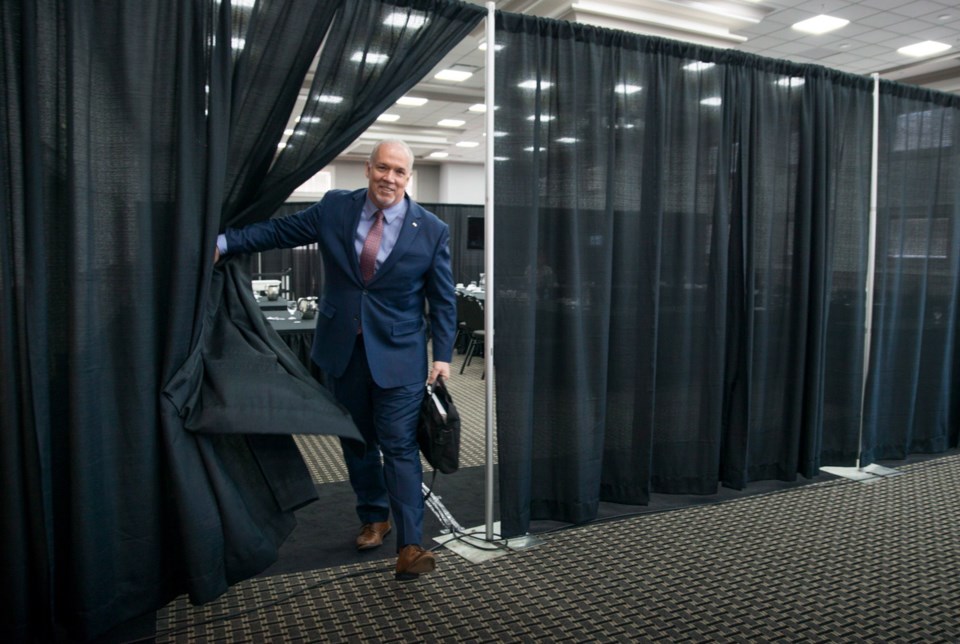YELLOWKNIFE — B.C. Premier John Horgan says he is fighting to both retain and restrict Alberta energy imports because while the existing shipments are vital to his province, the Trans Mountain pipeline expansion would see the unrefined oilsands oil go somewhere else.
“The proposal to twin the pipeline is not to send more product to the Lower Mainland, but to export to other jurisdictions,” Horgan told reporters after a meeting of western premiers wrapped up Wednesday in Yellowknife. “There’s a distinct difference between those two things. One is diluted bitumen. The other is gasoline or jet fuel to be used by [B.C.] citizens to move around freely.”
He made the comments after he was asked to explain why his government is going to court to determine if it has the right to regulate heavy oil imports while at the same time trying to stop Alberta from curtailing existing oil shipments to B.C.
Horgan denied a suggestion that his government’s position is selfish. “Not at all,” he said, stressing that they are two separate issues.
Horgan joined leaders from other western provinces and territories to discuss a range of shared concerns from cannabis legalization and pharmacare to market access. Alberta Premier Rachel Notley declined to go, saying she’s too busy trying to strike a deal to ensure Trans Mountain is built.
She sent deputy premier Sarah Hoffman, who declined to sign off on the meeting’s closing statement. Hoffman said Alberta didn’t endorse the document because there was no statement affirming support for Trans Mountain.
She said while she wants to proceed with the issues discussed at the meeting, it is folly to talk about how to spend money while ignoring critical issues on how to raise it.
“Talking about market access without talking about Trans Mountain ... is irrational.”
The line, which would twin an existing pipe and triple the amount of oil heading from Alberta to the coast, was approved by Ottawa in 2016, but has hit permit delays and legal challenges from Horgan’s government. Alberta said pipeline bottlenecks are kneecapping the industry, costing millions of dollars a day.
The pipeline builder, Kinder Morgan, has ratcheted back spending on the $7.4-billion project, citing B.C.’s obstruction tactics. The company says it needs assurance by May 31 that the line can get built.
Prime Minister Justin Trudeau’s government and Alberta are exploring a range of options including buying the project from Kinder Morgan or making sure whoever builds it is covered for any losses tied to political delays.
Horgan’s government has made clear it opposes the expansion over concerns about spills. His government has asked B.C.’s highest court to rule on whether B.C. can cap oil imports.
Alberta has passed a bill to allow it to reduce shipments of oil and other fuels to B.C., which could lead to gas-price spikes and other fuel-related hardships. B.C. has filed a suit in Alberta to stop Notley from turning down the taps, saying it violates the Constitution.
Notley told reporters Tuesday that Horgan’s logic is head-spinning — he wants the fuel on one hand, but is trying to keep it the oil out on the other.
Horgan, on a conference call Wednesday with B.C. reporters after the meeting, admitted things have gotten frosty on a personal level with Notley, someone he considers a friend.
“They did invite me to the swearing in of their government,” he said. “I went gleefully and enjoyed myself. Maybe I’m just an acquaintance. It does not really matter. It’s not about me.”
He said the last time he spoke with Notley was in Ottawa in April. “I think the tone between the two of us is strained,” Horgan said. “This is not personal for me. It’s about my responsibility to make sure that I’m doing my level best to protect our economy, our environment.”



